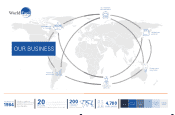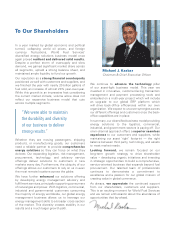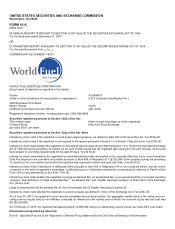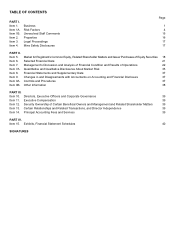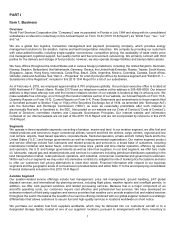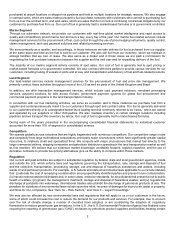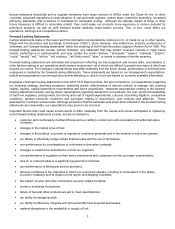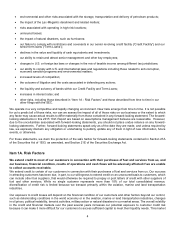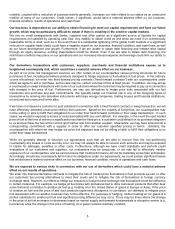World Fuel Services 2015 Annual Report Download - page 12
Download and view the complete annual report
Please find page 12 of the 2015 World Fuel Services annual report below. You can navigate through the pages in the report by either clicking on the pages listed below, or by using the keyword search tool below to find specific information within the annual report.7
corruption laws and trade control regulations. Violations of these regulations are punishable by civil penalties, including
fines, denial of export privileges, injunctions, asset seizures, debarment from government contracts and revocations or
restrictions of licenses, as well as criminal fines and imprisonment.
We have established policies and procedures designed to assist with our compliance with applicable U.S. and international
laws and regulations. However, there can be no assurance that our policies and procedures will effectively prevent us from
violating these regulations in every transaction in which we may engage, and such a violation could adversely affect our
reputation, business, financial condition, results of operations and cash flows. In addition, such a violation could also cause
an event of default under our Credit Facility, which if not waived, could result in the acceleration of any outstanding
indebtedness, could trigger cross defaults under other agreements to which we are a party (such as certain derivative
contracts), and would impair our ability to obtain working capital advances and letters of credit. Such events could adversely
affect our business, financial condition, results of operations and cash flows. Finally, various state and municipal
governments, universities and other investors maintain prohibitions or restrictions on investments in companies that do
business with sanctioned countries, which could adversely affect the market for our securities.
In the past, we have received administrative subpoenas from OFAC requesting information regarding our transactions in
countries that are the subject of U.S. sanctions. In responding to these subpoenas, we identified a limited number of
transactions that may have resulted in violations of U.S. sanctions regulations or our OFAC issued licenses. In each of
these responses, we noted that the transactions identified as potential violations resulted in very small amounts of revenue
to us. We routinely take actions to further strengthen our compliance-related policies and procedures. Nevertheless, should
OFAC determine that any activities constituted violations of U.S. sanctions regulations, civil penalties, including fines, could
be assessed against us. Additionally, in the course of its ongoing reviews, OFAC could request additional information from
us, in the form of additional subpoenas or otherwise, and we intend to fully cooperate with any such additional subpoenas
or requests. We cannot predict the ultimate outcome of any OFAC review, the total costs to be incurred in response to these
reviews, the potential impact on our personnel, the effect of implementing any further measures that may be necessary to
ensure full compliance with U.S. sanctions regulations or to what extent, if at all, we could be subject to fines, sanctions or
other penalties.
Our fuel storage and transportation operations have inherent risks that could negatively impact our stock price,
results of operations and financial condition.
Operating fuel storage and distribution terminals and transporting fuel products involve inherent risks including:
• oil spills and other environmental mishaps;
• fires, collisions and other catastrophic disasters;
• injuries and loss of life;
• severe damage to and destruction of property and equipment; and
• loss of product and business interruption.
Damage arising from such occurrences may result in fines and significant third party claims. We generally maintain
insurance to mitigate these types of costs, but there can be no assurance that our insurance would be sufficient to cover
the liabilities we might suffer from the occurrence of one or more of the risks described above.
In addition, if we are involved in a spill, leak, fire or other accident involving hazardous substances or if there are releases
of fuel or fuel products we own or have custody of, our operations could be disrupted. We could also be subject to material
liabilities, such as the cost of investigating and remediating contaminated properties or claims by customers, employees or
others who may have been injured, or whose property may have been damaged. These liabilities, to the extent not covered
by insurance, could have a material adverse effect on our business, financial condition, results of operations and cash flows.
Some environmental laws impose strict liability, which means we could have liability without regard to whether we were
negligent or at fault. Any of these occurrences, and any resulting negative media coverage, could have a material adverse
effect on our stock price and on our business, financial condition, results of operations and cash flows.
Information technology failures and data security breaches, including as a result of cybersecurity attacks, could
negatively impact our results of operations and financial condition, subject us to increased operating costs, and
expose us to litigation.
We rely on our computer systems and network infrastructure across our operations. Despite our implementation of security
and back-up measures, all of our technology systems are vulnerable to damage, disability or failures due to physical theft,
fire, power loss, telecommunications failure, operational error, or other catastrophic events. Our technology systems are


